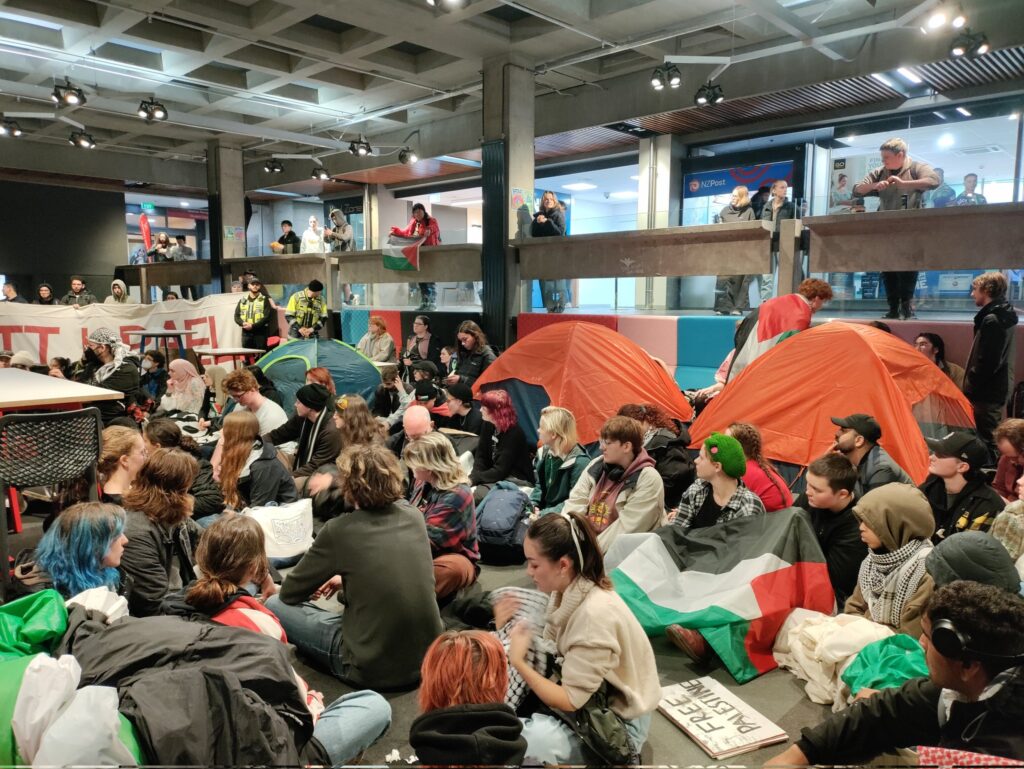Australia/Israel Review
AIR New Zealand: Double standards and discomfort on campuses
Jul 3, 2024 | Miriam Bell

New Zealand’s tertiary campuses have avoided the violent encampments seen in universities in other parts of the world, but there are still some disturbing antisemitic undercurrents evident on them.
In May, after weeks of reports of angry, destructive protests in the United States, the University of Auckland’s Student Justice for Palestine group announced it was planning an encampment of its own.
But the university issued a statement saying that, while it supported the right of students and staff to engage in peaceful and lawful protest, it would not support the establishment of an overnight encampment.
It had consulted with the police and would work with the students to facilitate a peaceful, lawful protest on campus, the university said.
The students called off the encampment in favour of a rally attended by around 100 people.
Shortly afterwards, 65 university staff and academics released a letter criticising the university’s stance, alleging it had mischaracterised the focus of the protest and not acknowledged a divestment call.
At the University of Canterbury, an encampment in a communal space lasted for 27 hours. It ended after the university agreed to various actions, including bringing a motion for an academic and cultural boycott of Israel to the academic board and looking into revising procurement to exclude Israeli companies.
While the student protests never approached the fevered level seen overseas, the atmosphere on university campuses left many Jewish students and staff feeling concerned and unsafe.
Australasian Union of Jewish Students (AUJS) New Zealand co-President Ethan Nemeroff said most Jewish students felt completely worn down by the fact that aggressively “pro-Palestinian” and anti-Israel material, such as posters and stickers, and misinformation was everywhere.
“It is very demoralising as you know that most of the people spouting this stuff don’t know what they are talking about,” he said.
“They have no comprehension of what Israel means to the Jewish people, and the connection they feel to it. So there’s all these people spewing the same lies and rhetoric that have taken social media by storm without a second thought.”
In New Zealand, AUJS had been dormant in recent years, but this year a new executive has reinvigorated it, and has been working hard to make sure Jewish students know they are not alone and that people are there to support them, Nemeroff said. There are now AUJS groups in Auckland, Wellington, Christchurch and Dunedin.
AUJS executives have also been talking to senior leadership at the different universities and providing them with information and material about antisemitism.
“They don’t know enough about the issues to respond in a way that makes Jewish students feel comfortable and confident that we can trust them,” he said.
“But they have policies which clearly state they don’t want to be a university that propagates discrimination based on national or ethnic origin. And they have a duty of care to students.”
“While some of the engagements have achieved more than others, we have made progress.
“One example is that initially there was no understanding of why chanting ‘from the river to the sea’ was a problem, but now they know what it means and that it is violent, and they have said they will act on it.”
Nemeroff said while the protests seemed to have burnt out a bit, it was not over yet.
“What has happened has taught me the importance of Jewish people looking after one another… We want to foster community, and make sure Jewish students know we are here to support and advocate for them.”
There are issues for Jewish academics, too. A prominent example was a “Zionists not wanted here” poster campaign at the University of Auckland earlier this year.
Dozens of posters were put up around the main campus over the course of around a week featuring an image of Dr David Cumin and some inflammatory text.
Cumin is a senior lecturer in anaesthesiology at the University, and is also a co-director of the Israel Institute of NZ.
He says they were racist, bigoted posters that put a target on a particular group of people using his face, “But it was not really about me, it was an attack on all staff who believe Jews should have self-determination in part of their indigenous land,” he said.
“It is most disappointing that no University leadership condemned the intolerance. I imagine there would have been an outcry if the posters said… ‘Asians not wanted here’.”
There had also been protests calling for “intifada” on campus, and at least three different protests have called to expel Zionists from campus. Other Jewish staff have also been named on social media, he said.
“The more incidents that occur and the more that senior leaders are silent, the more that discomfort grows. The leadership says they have zero tolerance for racism, so they should condemn what is happening,” Cumin said.
Tags: Anti-Zionism, New Zealand, campus protests





